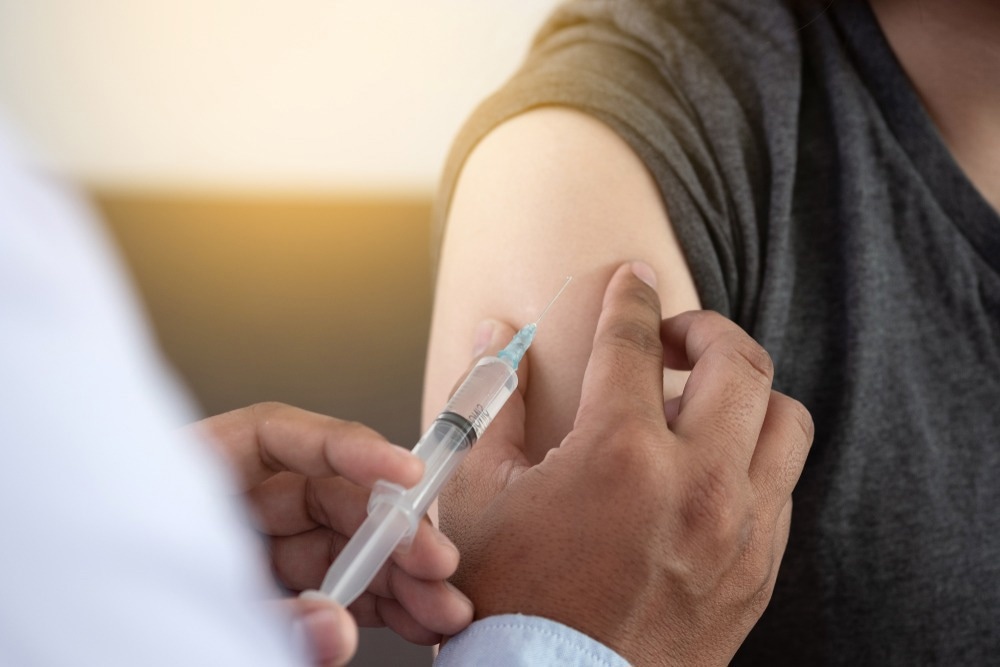The severe acute respiratory syndrome coronavirus 2 (SARS-CoV-2), the virus responsible for the coronavirus disease 2019 (COVID19) pandemic, quickly spread throughout the world after its initial discovery in December 2019. Due to the widespread disruption caused by COVID-19, vaccine development was accelerated at an unprecedented level, with the earliest vaccines approved for use within a year.

Study: Serum and Breastmilk SARS-Cov-2 Specific Antibodies Following BNT162b2 Vaccine: Prolonged Protection From SARS-Cov-2 In Newborns and Older Children. Image Credit: one photo / Shutterstock.com
Introduction
Pregnant and lactating women were deliberately excluded from the clinical trials of COVID-19 vaccines based on the messenger ribonucleic acid (mRNA) platform. However, animal studies failed to show any evidence of lactational disturbances following vaccination.
Soon after the vaccines were rolled out, many pregnant and lactating women chose to receive the vaccines due to their high exposure risk to COVID-19. Soon after, most professional societies determined that the benefits of COVID-19 vaccines exceeded their risk to these subsets of women and subsequently recommended that this patient population be offered vaccination after a discussion of the benefits and adverse effects.
Early on in the COVID-19 pandemic, women with a prior history of COVID-19 were found to produce anti-SARS-CoV-2 antibodies in breastmilk. These antibodies were primarily in the form of secretory immunoglobulin A (sIgA), which was capable of neutralizing the virus upon its entrance into the body.
The researchers of the current study examined breastmilk and serum samples from lactating healthcare workers at a single hospital in order to assess their antibody profiles following vaccination. Taken together, a total of 18 women who had received the Pfizer-BioNTech BNT162b2 COVID-19 vaccine and were between one and 36 months postpartum were included in the current study.
Serum and breastmilk samples were collected before the vaccination, three weeks later, three weeks from the second dose, and six months after the second dose. Serum IgG and IgA antibodies to the viral spike protein were measured and a ratio was obtained.
In breastmilk, sIgA and sIgG were assessed. These levels were then compared with a standard curve obtained by measuring corresponding antibodies in the breastmilk of women who had recovered from natural infection with SARS-CoV-2.
Study findings
Higher anti-spike IgG and IgA levels were observed in serum at all post-vaccination time points, peaking at three weeks from the second dose. However, six months after the second dose, these titers declined. Antibody levels showed less variation after the second dose as compared to the first.
Anti-spike IgA levels increasingly scattered at each time point. In fact, IgA levels within three samples that exhibited a low antibody response at all time points declined below the cut-off value at the last time point.
In breastmilk, sIgG increased after vaccination, with a slight peak at six months from the second dose. Comparatively, sIgA values were higher at the first two post-vaccination time points and peaked three weeks from the second dose, which was similar to the response observed in the serum. Nevertheless, sIgA levels declined to almost baseline values by six months from the second dose.
Implications
The most common way in which newborns become infected with SARS-CoV-2 is through airborne transmission from infected mothers. SARS-CoV-2 has also been identified to undergo vertical transmission as well, albeit infrequently. Importantly, breastmilk is not a medium of transmission and has not been found to contain a culturable virus.
Breastmilk is protective against respiratory viral infections, including influenza. The most basic protection is mediated by sIgA, which was found to be elicited against SARS-CoV-2 by natural infection and vaccination in lactating women. However, vaccination failed to produce a rise in sIgG in breastmilk in the current study.
Thus, mucosal immunity is boosted by repeated doses of the vaccine, thereby inducing sIgA, which is the primary immune response to SARS-CoV-2, followed by IgG. Both in lactating and non-lactating women, vaccination elicited a strong immune response. The magnitude of the response to the first dose predicted the eventual antibody levels, even considering the decline six months after the second dose.
This decrease may reflect a limitation of the vaccine, which is given intramuscularly and may not induce a robust mucosal antibody response. Breastmilk IgA originates from both serum and local breast mucosa-associated lymphoid tissue (MALT); thus, it is not correlated with serum IgA titers.
The decline in sIg levels over time should be interpreted with caution, as these levels tend to rise with continued breastfeeding. Extrapolating from earlier studies on other respiratory infections, it appears that IgG is an important protective factor in neonates.
We suggest a similar role in vaccine induced milk immunity and that the beneficial effects could last for months after anti COVID-19 vaccination with mRNA formulations.”
Given the increased severity of neonatal SARS-CoV-2 infection as compared to older children, it is essential to monitor the immune response to this virus throughout the first year of life. This will help optimize the time of vaccination in pregnancy and the puerperium for the greatest protection of both the mother and baby against the virus.
Vaccination during late pregnancy or lactation may be most beneficial to the newborn, as it provides both placental IgG transfer and mucosal protection through secretory IgA and IgG antibodies in breastmilk. With booster doses, the level of protection may be increased to ensure a longer period of passive immunity for the infant.
Journal reference:
- Ricciardi, A., Zelini, P., Cassaniti, I., et al. (2022). Serum and Breastmilk SARS-Cov-2 Specific Antibodies Following BNT162b2 Vaccine: Prolonged Protection From SARS-Cov-2 In Newborns and Older Children. International Journal of Infectious Disease. doi:10.1016/j.ijid.2022.06.055.